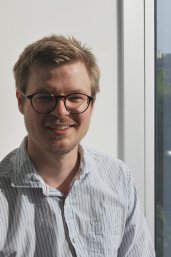Vita Titl on how his fascination with politics inspires him to set up new economics research
What kind of mind-set is needed to carry out ground-breaking research as we do at UUCePP? Researchers introduce themselves in brief interviews conducted by Elisabetta Manunza and Fredo Schotanus. Today: researcher and assistant professor Vitezslav Titl.

'Who' and 'what' are you?
My name is Vitezslav (Vita) Titl and I come from Czechia. Last year, I have received my PhD in Economics from KU Leuven with the thesis titled “The role of political connections and institutions in public procurement: Evidence from Czech administrative data”. A substantial part of my last PhD year, I have been visiting at Bocconi University and Princeton University. And since November 2020, I am an Assistant professor of Law & Economics at Utrecht University, School of Economics and also an affiliated member of the Utrecht University Centre for Public Procurement.
Currently, I am living with my partner Aniek in Brussels, Belgium. She is a statistician working for a pharmaceutical start-up. Our aim is to move to Utrecht as soon as the Covid pandemic will permit it. The crisis gives us more time to make the best choice in finding our new home.
I am fascinated by politics. Perhaps because of the recent political history in my country, which has come through a transition from a communist regime to a democratic, capitalist society. This fascination helps me in my research as lots of my work is closely related to corruption, the quality of governance and so forth.
My other hobbies include different sports: I love skiing, and in summer, I enjoy running, tennis, and golf. Two years ago, I ran Stockholm marathon, but I am not sure I will come back to that extreme form of running soon.
What are you working on, and why?
My research is focused on the effectivity and efficiency of the public procurement market from an economic perspective, with a special attention to the impact of legal rules and the effects of corruptive activities on the public procurement market. These markets are worth one seventh of GDP in developed countries (about one fifth in the Netherlands), which makes them extremely important from a societal point of view.
I would like to highlight two recent projects of mine. The first one is a joint work with Bruno Baranek and Leon Musolff from Princeton University and was recently supported by the Weiss Fund at Harvard University (titled “E-Procurement and Collusion: Evidence from Ukraine”). We aim at understanding how online monitoring by the public influences collusive behavior and other outcomes on the public procurement market. To study this issue, we employ datasets from Ukraine, where a new e-procurement system with an extensive online monitoring platform was introduced in 2015. In this online monitoring system, about 30 NGOs and countless private citizens submit reviews, abuse reports and more information about the public procurement market. Eventually, these abuse reports are often assed by the Ukrainian authorities and if a misconduct is found, firms can be fined and banned from the market. Thus, in a country with educated and motivated citizens, data transparency and a robust public procurement monitoring platform can enable the efforts of the public (volunteers) and partially substitute some governments’ tasks.
The second project called “The Role of Institutional Factors and Information in Public Procurement Markets” is concerned with the role of the legal requirement of at least two submitted bids to a tender and with the role of (the lack of) information in public procurement. I have recently obtained a 5-year grant from the Czech Science Foundation to work on this project. Michal Soltes, will work with me as a post-doctoral researcher on the second part of the project. In Central Eastern Europe (and also for example in the United States), a significant percentage of public procurement contracts is awarded in tenders, in which only one bidder submitted an offer. This equates to one fifth of the public procurement contracts in Czechia, and means that there is de-facto no competition in such cases.
The only firm that submitted its bid is also the winner. Intuitively, this could be suboptimal. Less competition could lead to higher prices and/or worse quality. To study the effects of this phenomenon, I aim to exploit a legal reform imposing a requirement of at least two submitted bids. This requirement could either just complicate the situation if there is indeed only one possible supplier. Alternatively, it could force procurement authorities to change their behavior and work on attracting more bidders, and thus, lead to lower prices and savings. I will empirically answer this question within the first part of the project. In the second part of the project, we will analyze whether firms lack information about relevant public procurement contracts and whether procuring authorities have information about good potential suppliers. A lack of such information can be one of the causes for low competition. We will measure how much these information issues affect the number of bidders and other outcomes such as prices and quality.

What I really enjoy about this research is its political importance. The findings and the recommendations of both these two projects should, if implemented, result in significant savings and/or a more efficient public sector.
What makes you get out of bed in the morning? And is this different because of the COVID-19 crisis?
I have never liked sleeping in too much. I enjoy my work so I do not have problem waking up for it. The Covid crisis did not change much about it, I do not sleep longer, but I am happy to save 1.5 hours in public transport daily so that I can work a bit longer.
Is there nevertheless something you appreciate in these changing circumstances? I can see two opportunities. First, the crisis might bring need for austerities, and therefore, taxpayers and politicians may be more interested in our research. They will hopefully care more about good research that shows how to effectively spend public resources. Second, at the beginning of the crisis, there was a need for various emergency procedures to be used instead of standard procurement procedures. I think it would be interesting to empirically study these contracts and any potential issues which may come from the larger discretion and limited oversight over public officers and politicians.
Should we go back to our old way of life after the crisis, or not?
This is a one million dollar question (actually one trillion dollar perhaps). The tax revenues of governments might be tighter than we were used to in the last years. At the same time, we will need to invest to restore growth. The effectivity of these public investments and also the exact manner with regard to sustainability and support of innovation will be crucial. Finally, as per usual, the public investments constitute an opportunity for corrupt firms and persons. That is when my research comes into play. It should be made sure that any potential conflicts of interests disqualify suppliers and good, clear procurement rules are in place.
What is your biggest dream or greatest ambition?
My ultimate goal is that the policy implications stemming from my research are implemented. Hence, I am working with think-tanks that help me to get my findings to a broader audience and I am also in touch with politicians that are willing to hear my advice. For example, currently, I am working on a policy report for the European parliament. This kind of outreach helps me stay motivated and have a real-world impact.
Which book has impressed you the most, has shaped you, and would you read 100 more times? And why?
I do not think I have such a book or thinker so I will rather mention a book I have read and enjoyed recently. It is called Sapiens: A Brief History of Humankind by Yuval Noah Harari, an Israeli historian working the Hebrew University of Jerusalem. I know that the book was not perceived well by other historians and anthropologists. But I do not see it as an academic work. To me, it was a fascinating read, full of interesting insights which were new to me.
And yes, I should admit that I have spent a bit too much time reading Harry Potter when I was young. I have read all 7 books multiple times.

